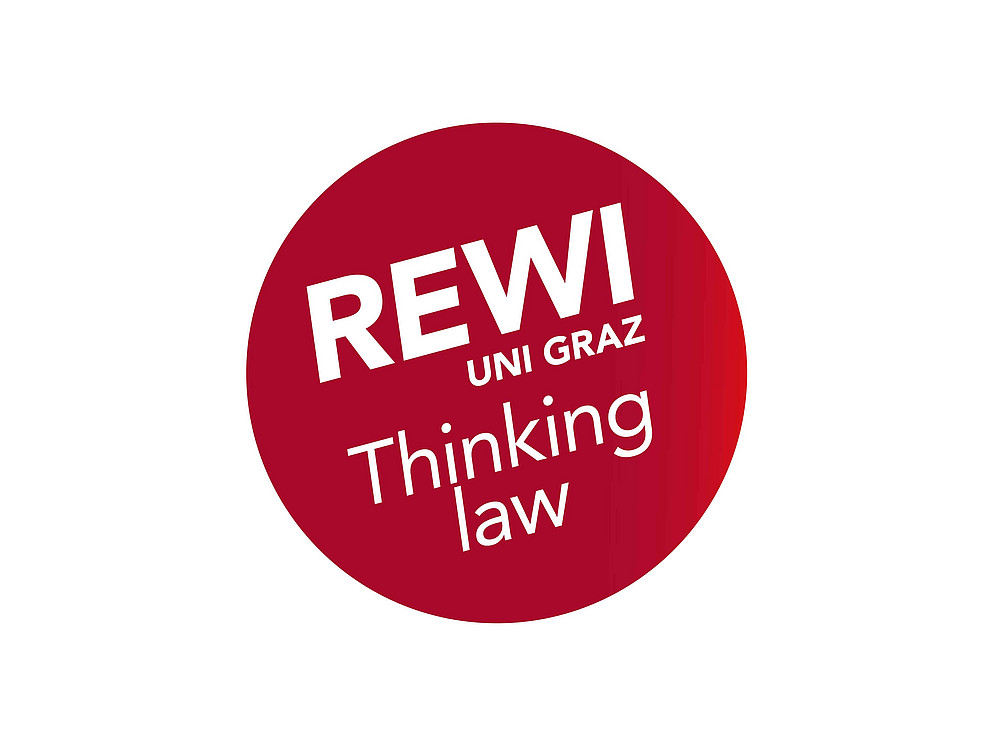Our Moot Courts
Would you like to apply your theoretical knowledge to specific practical cases and convince with your arguments? Our moot courts and our other practice-oriented courses offer you a special opportunity to put your acquired skills to the test. As part of the moot courts, you take on different roles in realistic proceedings and try to assert the point of view of the parties you represent. Together with your teammates, you will have to write pleadings and convince a jury, which is usually made up of practitioners, live in the courtroom. In recent years, the faculty has steadily expanded its range of moot court courses - so there is something to suit your area of interest!
To enable students to get to know situations from the professional life of lawyers as realistically as possible, the REWI University of Graz adapted a lecture hall in the RESOWI Center and was the first law faculty in Austria to set up its own moot court and negotiation room. The REWI thus offers its students the opportunity to train in a wide variety of practical legal situations during their studies and to prepare for their future professional life in more than just dry training. The faculty also endeavours to help students with any costs that may arise.

Our Moot Courts and Practice-orienteed Courses at a Glance
As part of Michael Friedrich 's course (Institute for Labour Law), you will recreate a fictitious appeal procedure as part of a declaratory procedure before the Supreme Court. For this purpose, your core task is to work in a team to prepare a notice of appeal and a response to the appeal and then defend it at the Graz Moot Court. The winners of this moot court will represent the University of Graz at the national finals in Vienna.
Together with your teammates, you will experience a fictitious case before the European Court of Human Rights in English in the Human Rights Moot Court courses in one winter and one summer semester. Your team represents both the complaining party and the defendant state and, supervised by Gerd Oberleitner(Institute of International Law) and Gregor Fischer-Lessiak, drafts written pleadings at the beginning of the winter semester. From December, you will then practise the oral presentation of your arguments before the court, including rhetoric training. In February, a preliminary round will take place at a European university (in Maastricht in 2023, for example), followed by the final in Strasbourg in May if you qualify. In the past, our students have already won the prizes for Best Written Submission and for the best individual speaker (Best Orator) in a preliminary round. The best of the best in the final can look forward to paid internships at the ECHR and the Council of Europe. With your participation, you will also meet all the requirements of an entire specialization module N. You can find more information here. We are counting on you!
Under the supervision of Sascha Ferz and Johannes Zollner, participants of this course acquire, in a first step, theoretical knowledge about intellectual property rights and the technique of negotiating in court. Afterwards, students will be given a practical case study for an intellectual property dispute. In teams, students must draft pleadings for the trial from the perspective of the plaintiff and the defendant. At this stage, the different teams are supervised by selected legal practitioners. At the end of the seminar, students are given the opportunity to present the pleadings they have drafted in court and to present their legal knowledge and negotiating skills to a jury. Are you interested to acquire or deepen your practical knowledge in IP law? Apply now to do so!
In the first part of the Mock Mediation Competition, you will use theoretical input and practical exercises (role plays, etc.) to learn what mediation is (process, phases), the conditions under which mediation can be a suitable method of conflict resolution and how to use special techniques in a targeted manner.
In the second part, you will put your communication and negotiation skills to the test in fictitious mediation sessions (mock mediation) on the topics of family, business and neighborhood. Supported by Sascha Ferz(Institute for Legal Studies), you will compete against teams from the University of Vienna, with your team's performance being assessed by a panel of experts. In the run-up to this competition, each team has to prepare initial case analyses in written form. These will deal with the conflict from the perspective of the mediator (conflict analysis, potential approach to mediation, possible setting), the parties to the conflict and the party representatives (assessment of legal consequences).
The Telders Moot Court (TMC)is the largest European moot court in the field of general international law in English. Universities from all over Europe take part in the final rounds in The Hague. The judges in the international elimination rounds are renowned professors and lawyers. The subject of each round is a fictitious legal dispute between two states before the International Court of Justice (ICJ), which is based on current issues of international law.
In the winter semester, you will work in teams to draft the memorials, which must be submitted by March. In the summer semester, you will prepare for the oral pleadings. In particular, you will practise presenting the main points in a short space of time and answering the judges' technical questions politely, firmly and comprehensively.
In addition to the coaching sessions, rhetoric training and many other practice opportunities in Graz, a number of team excursions are planned from which the team members can benefit both professionally and personally, namely a pre-moot workshop in Budapest, pre-moot friendly practices, a national preliminary round if necessary, and finally the TMC final rounds in The Hague.
At the 45th edition of the Telders Moot Court 2022, the Graz team, supported by Erika de Wet(Institute of Public International Law), achieved considerable success. The team took 6th place overall out of a total of 25 participating teams and was awarded further top places in the various individual categories. Next up: you?
How does administrative law protect the environment - and how are infrastructure projects approved? In the Environmental Law Moot Court, you take on one of the roles of the parties involved in an approval procedure (project applicant, neighbor, legal party and authority). Together with your teammates, you will go through the application process, the raising of objections and the official resolution of the matter. You will draft pleadings, negotiate orally and compete against teams from the universities of Innsbruck, Salzburg, Linz and Vienna (plus WU). You will be coached by Georg Eisenberger(Institute of Public Law) and renowned experts from the field.
In 2018 and 2019, the Graz team won the entire competition. We are counting on you for further great successes!
Would you like to know in detail how a company is acquired in practice? In the company acquisition moot court, you will first acquire theoretical knowledge about company acquisitions (mergers & acquisitions - M&A) and negotiation techniques. You will then be given a practical case study of a company acquisition. You will then work in teams with your colleagues to draw up draft contracts from the perspective of the seller and the buyer for the planned company acquisition. At this stage, you will be supervised by Johannes Zollner(Institute for Corporate Law) and selected legal practitioners. At the end of the course, you will have the opportunity to negotiate the draft contracts you have drawn up with the respective other party and demonstrate your legal knowledge and negotiating skills in front of a jury.
The Willem C. Vis International Commercial Arbitration Moot is the most prestigious international competition for students in the field of arbitration. It is a fictitious arbitration in English within the scope of the UN Convention on Contracts for the International Sale of Goods. The Vis Moot was held for the first time in Vienna in 1994, where it has been held annually ever since. Over 2000 students from more than 370 universities from over 70 countries, as well as renowned arbitrators, lawyers and professors from all over the world, now take part.
The participating universities send selected, intensively prepared students. They then have to solve a cross-border legal case and represent their own side against other universities. Over the course of the competition, each team must also represent both sides and prepare written pleadings. Finally, there are oral pleadings. During the oral arguments, a tribunal of three arbitrators decides on the winner(s) of the round.
Every year, a team of students takes part in the competition with the support of Walter Doralt(Department of Civil Law) and Christian Aschauer(Department of Civil Litigation). You prepare for the Vis Moot in three practical sessions (Claimant Memo, Respondent Memo and Pleading and Oral Competition) between October and March. In the past, Graz teams have repeatedly shone with great performances - in 2022, for example, our students were one of only 18 award-winning teams among the 366 participants. Let's keep it up - with you?
All Austrian law faculties and the Vienna University of Economics and Business participate in the Franz von Zeiller Moot Court in Civil Law. The premise is an (admittedly fictitious, albeit realistically conducted) civil case in the third instance. The competition is therefore based on decisions by courts of second instance, which the students have to fight against in teams of three before the "Supreme Court", taking into account all the rules of civil procedure law. The teams, which are supervised by Ulfried Terlitza(Institute of Civil Law) and selected legal practitioners, first have to draw up corresponding written pleadings within the deadline and then present their arguments as convincingly as possible orally during the final hearings, the highlight of the competition.
The nationwide Civil Law Moot Court spans an entire academic year: the winter semester is dedicated to the local preliminary rounds at the participating faculties, with the winning teams from the preliminary rounds then representing their home faculty at the national final, which takes place in the summer semester.
The Graz team won the competition in 2022. It's time to build on this - apply!
